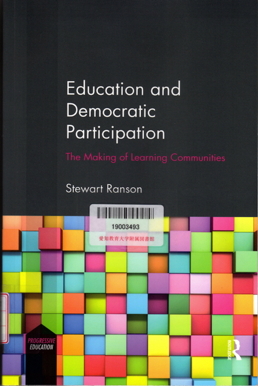Stewart Ranson, (2018)
Education and Democratic Participation, Oxfordshire/New York.
I read this in February 2020.

This book, published in 2018, was partly relevant as a response to
the divisiveness of the 2016 Brexit vote. However, it is now also
relevant as Britain and other countries around the world respond
to and deal with the Covid-19 (Coronavirus) Pandemic. It can only
be tackled by a community based response, with the challenge of
protecting old and vulnerable people, as well as health workers,
while dealing with huge disruption to the economy. As I write, it
has led to unprecedented (in peacetime) ‘lockdown’ measures,
particularly in Europe, quite apart from the location of its
origin, in Wuhan in China, as well as international transport
restrictions.
Obviously, a short review will not allow me to go into detail on
the content of this work. The writer includes discussion of
important theory from writers including John Dewey and Lev
Vygotsky on pedagogy and, more widely, writers including J.S. Mill
and Alexis de Tocqueville on participation in democracy. These
provide a model for the writer’s desire to see democratic and
community based education. In the case of the U.K., this would be
based around comprehensive schools, which educate all students
together from the age of 11. Having experienced one himself after
failing in the previous system, where students were divided into
grammar and secondary modern schools by the 11 plus examination ,
he is therefore negative about current changes to a more divisive
system of ‘academies’, especially at secondary level. These are
outside the control of L.E.A.s (Local Education Authorities),
which connects with less democratic control by the local
community. He sees a democratic local community as a cohesive
force and the divisiveness created by these autonomous
‘academies’, even though they are publicly funded, as negative.
This is in line with the views of Robert Verkaik in Posh Boys, who sees
independent (private) schools as even more divisive. As Ranson
sees it, the current system in the U.K. involves, “Self-managing
schools, and different types of school….created in a
quasi-marketplace of parental choice regulated by Whitehall
(central government) which sought to undermine ‘the producers’ of
education - teachers and local authorities - in favour of a
competitive market of ‘consumers’.” (p.6)
For him, education is important to allow, “reimagining the nature
of citizenship, not as a client to o professional authority, or a
consumer in the marketplace, but as active participation in the
public sphere.” (xvii). Particularly interesting are short
‘vignette’ sections, which act as case studies, including schools
where community participation became much improved through active
and wider involvement. In one which describes a situation outside
the U.K., in Wisconsin in the U.S., such changes were a struggle,
but, “the conflicts had a positive effect, too. They brought the
parents and teachers together and taught us that a successful
urban school needs an active parent/teacher/community alliance to
sustain it and a common vision of what the school is working
towards. Our ability to overcome these problems also gave us the
courage and the energy to confront the many challenges that lay
ahead.” (p.100)
Working together is precisely what we need to do as we face the
challenges which are with us as I write.
See the previous book which I have outlined.
